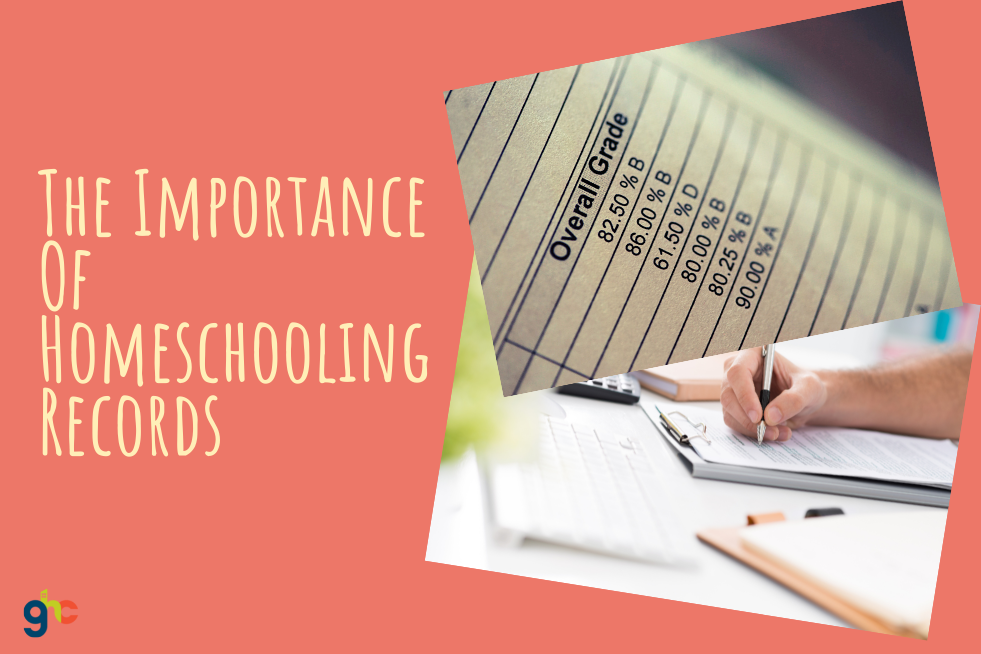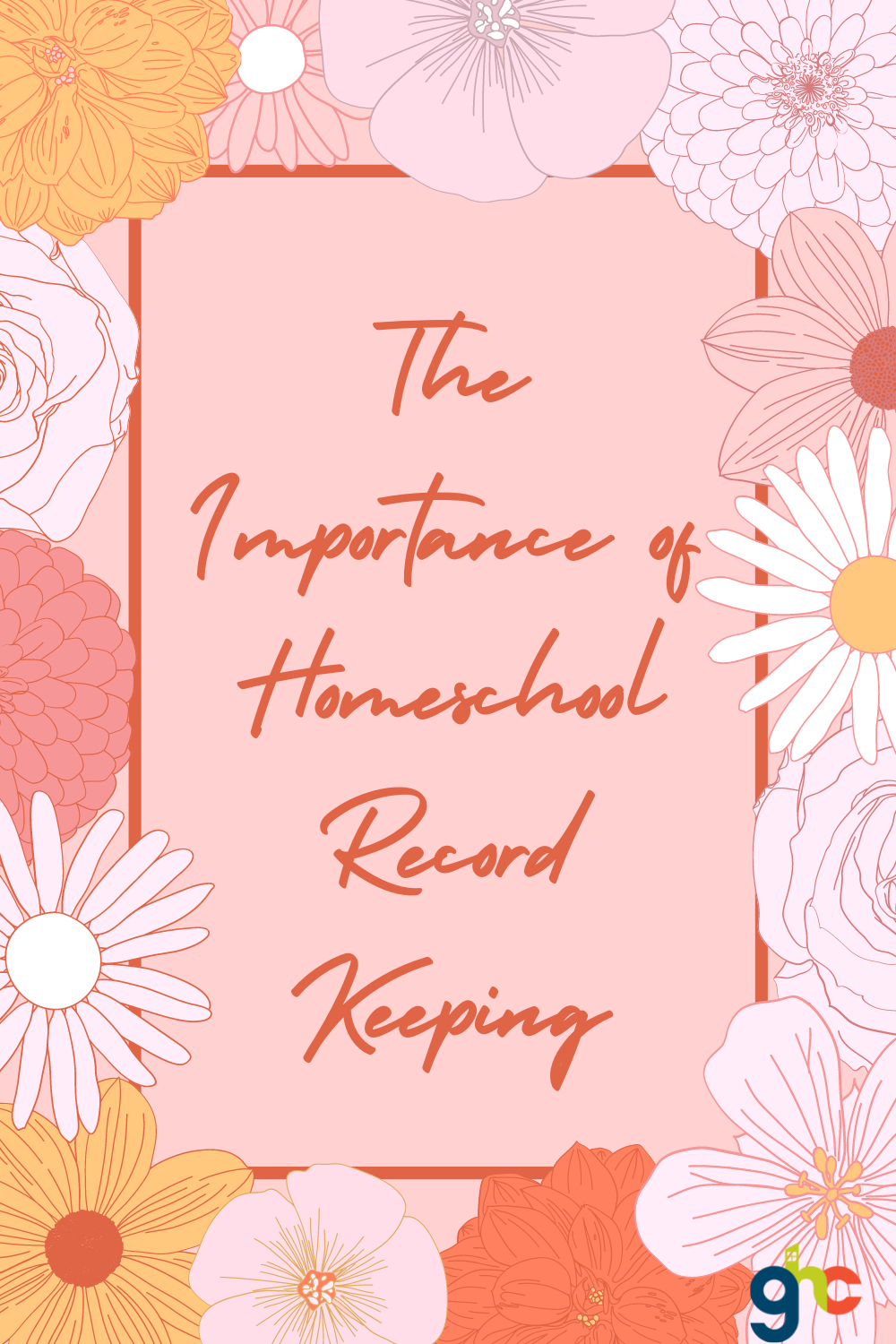The topic of homeschool record keeping is of the utmost importance, no matter where you are in your homeschooling journey. We will be looking at what it’s like to keep records at specific levels so that nothing is left out. It’s well worth it to keep records and we’ll explain that in detail as we continue.
From a strictly legal standpoint, state regulations vary depending on the state in which you live. Some states require more rigorous recording than others do, and you certainly want this to be your first consideration, to stay up to date with current legal requirements. To find out what those requirements are for your own home state, CLICK HERE.

Why Is Homeschool Record Keeping Important?
“Isn’t it funny how day by day nothing changes, but when you look back everything is different?” C. S. Lewis
Keeping up with your homeschool records can be very important, especially if you live in a state where regulations require very specific records. But there are other reasons to make sure you have everything documented. Here are some of the most important reasons, in no particular order.
- To stay current with your state homeschooling laws and regulations – In some states, strict records are mandatory, not optional. You might have to track days or hours (sometimes both), homeschool attendance records, or specific subjects you’re teaching. A simple Google search can yield several software programs that can help you keep track of all of these, with the ability to print out reports to make the process much easier. However, if you’re a classic “pencil and paper” teacher, a three-ring binder with dividers and the appropriate charts or lists can work wonders.
- To keep track of progress made (or lack thereof)– Sometimes it’s not easy to see how far you’ve come, especially when you’re lost in the middle of a hectic school year. It’s easy to forget things you were sure you’d remember, and if you don’t record grades, it’s easy for assignments and tests to get lost in the collection of paperwork you and your child have on hand. Keeping track of grades, test and quiz scores, time spent on studies and electives, field trip logs, and even volunteer activities can help you get “the big picture” a lot easier than if you kept no records at all. This is very helpful for the end of the year, when you are filing the records away. Again, you can take your pick between using software or a regular binder to keep these records.
- To maintain accountability for your student – Making sure your kids have some form of accountability is very important at any grade level. If they think they’re working “for nothing” they are far less likely to put in very much effort at all. When you have a method in place for the accountability, it not only keeps them motivated to push through even the hard assignments, it gives them a great sense of accomplishment once they’re finished. On the other hand, it can also help keep you accountable, as well, with a clear view of what needs to be taught versus what needs to be graded and recorded.
- To create report cards and high school transcripts – Report cards are a great way to show progress throughout the year and the basis for allowing your child to move forward a grade or be held back for further instruction. In high school years, those records need to be turned into transcripts, as most college admissions will not even consider an applicant without one.
- To “Prove It” – You might need to prove it to yourself, as homeschool teacher, to your students, who thought they couldn’t do it, or to others, who might swear you’re not actually teaching at all. Of course, anyone can “fake” homeschool records by making up school work to fill in the blanks, but at least in the first two instances, both you and your child will know the truth. And sometimes, it simply takes seeing the results of your efforts in black and white to know that you’re really capable of doing this after all.
What Should Homeschool Records Consist Of?
We’ve already mentioned that there are some records that are required by law, depending on your state requirements. Keeping that in mind, the following list is not a “legal requirement” for every homeschooler. Keeping track of all these records, however, does safeguard you and help get your child ready for the college application process and more. Even some employers seek out educational information. The bottom line is this: the importance of homeschool records should never be underestimated. With that in mind, here are the records I suggest that you keep for each school year.
- All correspondence with your local school board (including Letter of Intent (LOI) or any other form or letter of communication)
- Vaccination and immunization records (or records of exemption from vaccinations)
- Homeschool attendance sheet
- Homeschool grade records and report cards
- Quiz, Assessment, and test results
- Textbooks and workbooks used
- Homeschool curriculum used
- Work samples of your student's work(portfolios)
- Field trip logs
- Reading logs
- Elective records, i.e., music lessons, voice lessons, specialized art classes, etc.
- Club records (chess club, book club, etc.)
- Sports participation logs
- Volunteer or community service records
- Courses taken in high school that count towards college credit
- Proof of accomplishments, certifications, contests, and/or awards
- On the job training
- Anything else that would count towards proof of your child’s academic career
Don’t Let Yourself Get Overwhelmed
Remember, it’s only necessary that you keep those records dictated by state homeschooling laws and regulations. Anything more is certainly a benefit in later years, but not entirely necessary. In high school, records and transcripts must be far more detail-oriented, especially when your child is on track for college, but that can wait until the 8th or 9th grade, if necessary.
The truth is, “quality over quantity” is always the rule of the day. When we make homeschooling about learning, everyone wins! To get caught up in a paper trail – while it has its advantages – should never be the focus of any homeschooling year.
What’s the Best Homeschool Record-Keeping Method?
The method you choose for keeping your homeschooling records can vary greatly. There are many available methods, but the most important thing is that you find the one that works best for you and your family. If you have to force yourself to use a particular method because “everyone else is using it”, it’s likely you’ll eventually fail. This could create gaps in your records which, depending on the state you live in, could have very dire consequences. So, no matter which method you use, be sure it’s one you like, one that you’re comfortable with, and one that doesn’t cause you too much stress in just filling it out.
With that in mind, here are some of the most common methods of recording homeschool records.
- · Hard-Copy Record Books – For the old-fashioned homeschool teacher, an actual record book is the perfect method for recording grades, lesson plans, test scores, and attendance. For those who prefer something authentic, you can check out your local teacher supply store or browse around online for an extensive variety of options. Chances are, no matter what you’re looking for in a record book, you’ll find it on the web. However, for the frugal homeschooler, you can also create your own based on printable pages (also found online, and most often, for free), hand lining paper based on your own needs, or even using a single-subject notebook. Even a simple daily planner can work.
- · Record Keeping Software – For those who prefer to work with their records electronically, a record-keeping software is perfect. It makes it particularly easy if you’re homeschooling more than one child, or if you want to quickly pick specific records to print, such as report cards or homeschool transcripts. Just like record books, record-keeping software can be found abundantly with a simple Google search. However, prices range from “free” to “very expensive” so be sure you shop around to find exactly what you want and need and don’t spend more than you have to.
- · Cloud-Kept Records – Storing your homeschool records online, in a subscription-based website, has many advantages. First of all, you won’t have to actually download a program onto your computer that might harbor a virus or phishing program. Second, you won’t have to worry about losing all your information in the event of a major computer malfunction when you haven’t backed that information up to a hard copy, disc, or other form of backup. As with previous options, you can search to find the subscription that works best for you. And finally, you can access these records from anywhere, from any device.

In Closing
Record-keeping looks different for every homeschooling family. What works for one family might not work for you, while what works perfectly for you might not work for anyone else. The important thing is that you find a method that works, you keep every single record that you’re required to keep, and you keep them for the length of time (at least) that is required by law in your home state.
It’s true that keeping more records than you have to can be beneficial, but it should in no way become such a burden that it drags your entire homeschooling experience down. If you have trouble understanding exactly what is expected of you with regard to records, be sure to contact a local homeschooling organization or co-op or the HSLDA (Homeschool Legal Defense Association).
Another option for learning more about how to keep proper homeschooling records is attending a Great Homeschool Convention near you. With seven regional conventions held across the United States, we offer amazing speakers and special events, hundreds of informational workshops on relevant topics to homeschooling families, and dozens of speakers with experience in the homeschool movement. You’re sure to learn a great deal even if you only attend a single convention!
To find out more, visit Great Homeschool Conventionson the web where you’ll find a detailed list of all the speakers, events, and workshops, as well as information on each individual convention. You’ll also find information on hotel deals and packages, especially for our convention attendees. Our Great Homeschool Conventions are: Equipping. Encouraging. FUN!
